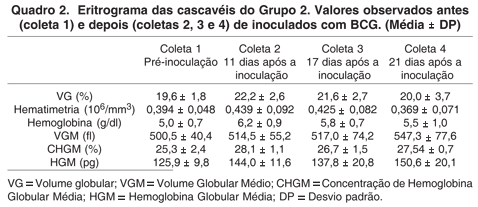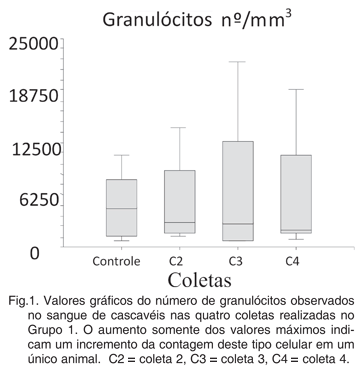The high demand for anti-venom production in response to the increased number of cases of snakebite envenomation highlights the importance of raising and breeding venomous snakes in captivity. Knowledge of types of venoms and anti-venoms is of great interest to public health. The maintenance of venomous serpents in captivity started in the early twentieth century, but still nowadays it is a challenge to manage and prevent diseases in captive fauna. Hematology is commonly used for general health assessment and illness detection. However, data on serpent blood analysis are still scarce. Alterations in hematological parameters were experimentally induced in rattlesnakes by the inoculation of BCG. Based on this, hemograms can be used as a health auxiliary diagnosis method for bacterial diseases in this species. In this study, blood samples were taken from 10 healthy specimens of rattlesnakes (Crotalus durissus) born and bred in captivity in the Herpetological Division of Vital Brazil Institute. Animals were divided into two groups (group 1 and 2) with similar live weight and sex proportion, and were then inoculated subcutaneously with BCG (Bacillus Calmette-Guérin). Blood samples were taken before and after inoculation at three experimental times (days 3, 5 and 7 for group 1 and days 11, 17 and 21 for group 2). Hematological analysis was performed through semi-direct technique, blood samples were diluted in Natt and Herrick solution and smears were stained by Giemsa. Serpents from group 1 developed discrete anemia due to the inflammatory syndrome, and showed significant decrease of MCH and MCHC. Granulocytes were characterized by the presence of rough granules. The azurophils varied in shape and size and showed large amount of cytoplasmic vacuoles. The thrombocytopenia observed in group 2 suggests that these cells participate in the inflammatory process. A single individual from group 1 showed granulocytosis and a few animals showed a discrete azurophilia. In general, BCG inoculation unleashes hematological inflammatory responses characterized by the presence of thrombocytes, azurophils and granulocytes cells.
Crotalus durissus; inflammation; BCG; hematology; reptile








